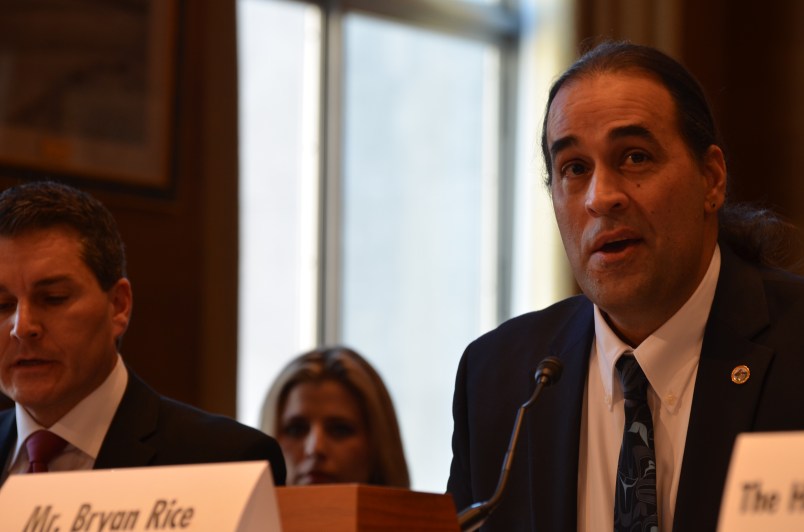When the Director of the Bureau of Indian Affairs (BIA) abruptly resigned last week after less than six months in his post, the agency gave no explanation.
But an e-mail from a BIA employee obtained by TPM claims the director, Bryan Rice, exhibited aggressive and intimidating behavior toward her in an incident she believes was captured by a surveillance camera. The woman involved and her supporters have been urging tribal leaders — via e-mail and social media — to submit Freedom of Information Act (FOIA) requests to the Interior Department for the video of the alleged incident. At least five did so in the weeks leading up to Rice’s resignation, according to the agency’s FOIA logs.
The five identically worded FOIA queries read: “Request footage of the Indian Affairs FOIA Officer, Jessica Rogers and Bryan Rice, Bureau of Indian Affairs Director on the 4th floor north and south hallway in the main Interior building on December 6, 2017, between on or about 9 am and noon.”
On March 26 of this year, BIA FOIA officer Jessica Rogers blasted out an e-mail to Native American tribal leaders calling Rice “an insidious perpetrator of harassment” and encouraging them to submit FOIA requests for video of Rice “exerting intimidating and hostile behavior” toward Rogers.
“The Bureau of Indian Affairs Director, Bryan Rice repeatedly pointed his finger in my face in a harassing and bullying manner,” Rogers wrote in the e-mail obtained by TPM. “I respectfully request and urge you to do everything in your power to hold the Federal Government accountable.” In the e-mail, Rogers described Rice’s behavior as “pervasive,” and included detailed instructions for filing the FOIA request.
The agency’s FOIA logs reveal that at least five people have followed Rogers’ instructions, filing identical FOIA requests between March 25 and April 3.
Rice resigned on April 24. DOI did not give a reason for his departure, with the agency’s spokesperson telling reporters: “It is our policy not to discuss DOI personnel matters in the press.”
Katherine Atkinson, an attorney who represents Interior Department and other federal employees with workplace discrimination and harassment claims, told TPM that there appears to be a connection between the accusations and Rice’s ouster.
“A current DOI employee told me Bryan Rice left his employment following an allegation of harassment,” she told TPM.
Rogers, a citizen of the Cayuga Nation in New York State, wrote in her e-mail to tribal leaders that she is pursuing “several channels within the Department of the Interior” to try to obtain documentation of the incident at issue. Asked by TPM whether the agency’s Inspector General’s office received complaints about Rice or began looking into his conduct, the office’s spokesperson declined to confirm or deny.
“I have no information whether or not there is an open investigation at this time,” Nancy DiPaolo said.
DOI did not respond to TPM’s inquiry about the reasons for Rice’s departure.
Rogers did not respond to TPM’s questions about her encounter with Rice and the agency’s subsequent handling of the incident.
Rice did not respond to efforts to contact him through social media and through the Cherokee Nation, of which he is a member.
Rice, who was appointed by Interior Secretary Ryan Zinke to lead the BIA in October, has served in various DOI and Forest Service posts since the mid-1990s. Darryl LaCounte, who had been serving as the BIA’s Rocky Mountain Regional Director in Billings, Montana was named acting director following Rice’s departure.
The allegations against Rice come as recent investigations have uncovered evidence of widespread harassment problems at the Bureau of Indian Affairs. In March, an employee survey conducted by DOI revealed that 40 percent of BIA employees said they had been harassed during the past year — a higher percentage than at any of the other eight Interior Department bureaus. And last May, an internal investigation found that a BIA employee had sent unwanted and sexually explicit texts and Facebook messages to tribal members over a two-year period, and that BIA’s leadership made “little or no effort” to investigate and address the problem.
Rogers referenced these reports in her e-mail to tribal leaders, writing: “These statistics are alarming. It clearly indicates that the Bureau of Indian Affairs is not mission focused and is instead riddled with cancerous harassment and bullying — it directly takes away from the people we serve in Indian Country.”
In January, Rice himself sent a memo to BIA employees on “Anti-Harassment and Workplace Conduct,” telling them that he was working to prevent discrimination and harassment in their office and taking steps “to correct any inappropriate conduct that occurs before it becomes severe or pervasive.”
Just last week, Secretary Zinke unveiled a new agency policy on harassment, and promised to crack down both on harassment and on retaliation against those who report it within the DOI.
“We have to take decisive action to hold employees accountable for misconduct,” Zinke’s memo reads. “I want you to know that discrimination, harassment, and intimidation will find no quarter under my command.”










